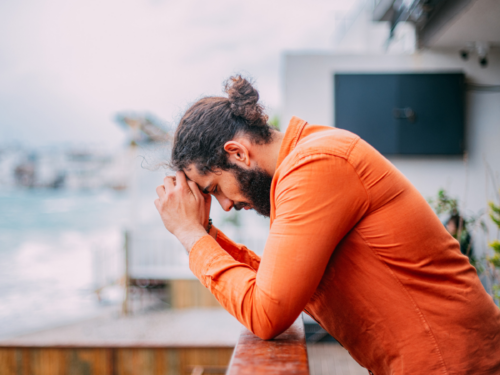
Table of Contents
What to Know About Opioid Use Disorder Treatment Options

Written By: Ashley Laderer

Clinically Reviewed By: Chris Hinton
May 30, 2025
7 min.
Are you considering different opioid use disorder treatment options? Keep reading to learn more about effective approaches to help you recover from this substance use disorder.
Learn more about our Clinical Review Process
Table of Contents
We are living through a serious opioid crisis. Estimates indicate that over 6 million people aged 12 and above in the U.S. have an opioid addiction or opioid use disorder (OUD). And tragically, data shows that opioid overdose-related deaths have been on the rise. Put simply, opioids like oxycodone, morphine, heroin, hydrocodone, and fentanyl are killing tens of thousands of Americans every year.
If you have opioid use disorder and you’re ready to take action, there’s hope. Although the path to recovery isn’t necessarily an easy one, getting sober can change and save your life. Read on to learn more about common treatment options for OUD and how to access the care you need.

Recovery from opioid use disorder is possible with the right support
Virtual, intensive therapy for substance use disorders, including medication-assisted therapy where available.
Inpatient care for opioid use disorder treatment
If you have severe opioid use disorder, inpatient treatment is often recommended over outpatient care. “Inpatient care offers a safe space to concentrate on recovery without being exposed to triggers,” says Dr. Shanard Clemons, a Group Facilitator with Charlie Health.
“Inpatient therapy can provide the structure and support required to stabilize individuals who have not previously succeeded in outpatient programs because of non-adherence, dropping out or lack of progress,” he said. Cases where inpatient treatment is beneficial include:
1. Physical dependence and withdrawal risk
Opioid withdrawal can be life-threatening in some instances. If you have high opioid dependence, you are likely to have medically dangerous withdrawal symptoms, and you may require medical detoxification from opioids in an inpatient setting, Dr. Clemons says. This is especially the case if you also abuse alcohol and/or benzodiazepines.
2. Co-occurring mental health conditions
If you have co-occurring disorders, getting clean can feel more complicated. Inpatient care can keep you safe with support, especially with mental health conditions like schizophrenia, bipolar disorder, or severe depression with suicidal thoughts, Dr. Clemons says.
3. High risk of relapse or overdose
“A more regimented and regulated setting might be advantageous for people who have a history of repeated relapses, particularly following outpatient treatment,” Dr. Clemons says. Additionally, if someone has gone through a period of abstinence and their tolerance is lower, they are at risk of overdose and can benefit from close monitoring, he adds.
Speak with a medical professional to determine if inpatient treatment for OUD is right for you.
Medication-assisted treatment for opioid use disorder
Medication-assisted treatment, or MAT, is helpful for many people with OUD. Various prescription drugs can help you get sober and stay sober from opioids, including the following.
1. Methadone
Methadone treatment can help both block withdrawal symptoms and reduce craving, making it helpful during initial recovery and lasting recovery. “Methadone is a complete opioid agonist that is administered in doses that are regulated,” Dr. Clemons says. “By normalizing daily life, it helps people avoid the highs and lows associated with illegal opioid use, allowing them to concentrate on their recovery.”
2. Buprenorphine
Buprenorphine is a medication that lessens withdrawal symptoms and opioid cravings by activating the same brain receptors as opioids, but to a more subtle degree, Dr. Clemons says. He adds that buprenorphine treatment aids in brain stabilization, reduces your desire to take opioids, and lessens withdrawal symptoms.
3. Buprenorphine-naloxone
Often referred to by its brand name, Suboxone, this drug combines buprenorphine and naloxone, which blocks the effects of opioids, preventing the feeling of getting high. This effective treatment has a lower risk of misuse than buprenorphine since it also blocks the euphoric effects of opioids. Naloxone is also used in overdose prevention.
4. Naltrexone
Naltrexone is a medication that blocks you from feeling the high of opiate drugs. It is an opioid antagonist, which means it prevents opioids from binding to the receptors in the brain, resulting in a euphoric feeling. “As a relapse prevention strategy, it is helpful for those who are already detoxed and wish to maintain their sobriety,” Dr. Clemons says.
A mental health provider knowledgeable in substance use disorder and/or addiction medicine will determine which of these medication-assisted treatment options is best for you.
Therapy for opioid use disorder treatment
“Therapy treatment can help change your attitude and behaviors related to substance use, build healthy life skills, and help implement other forms of treatment combinations,” says Nicole Lonano, MS, a Charlie Health Group Facilitator. Various therapy modalities can help, depending on your individual needs.

IOP for Addiction: How Intensive Outpatient Programs Treat Substance Use Disorders
Charlie Health Editorial Team
1. Cognitive behavioral therapy (CBT)
“Cognitive behavioral therapy can help you recognize and stop negative patterns of thinking and behaviors,” Lonano says. “It teaches coping skills, including how to manage stress and change your thoughts.” Plus, CBT is an effective treatment to address underlying causes related to your drug use, helping you to manage symptoms of co-occurring disorders.
2. Motivational interviewing and motivational enhancement therapy (MET)
These closely related therapies help you gain motivation to change and get sober. You can overcome ambivalence towards quitting opioids –– knowing that you should quit but not really wanting to, for example. You’ll uncover your motivations for change and set goals to do so.
3. Contingency management
Contingency management is a reward-based behavioral therapy approach to treatment. It uses positive reinforcement to motivate you to stay sober. When you remain sober, you’ll get a reward, such as a voucher or gift card. If you don’t pass the drug test, you won’t get a reward. Research suggests that contingency management can be an effective part of OUD treatment.
4. Group therapy
Therapy in a group setting led by a mental health professional is another beneficial option. “Group counseling can help you feel that you are not alone,” Lonano says. “Listening to others who may share similar situations can help build new strategies for dealing with situations you may come across.”
5. Family counseling
For teens with a substance use disorder or families whose relationships are damaged due to drug use, family therapy plays a key role. Family counseling can also help partners and spouses repair and improve their relationships, Lonano says.
Lifestyle changes to complement opioid use disorder treatment
Getting sober is a major lifestyle change. As you embark on this new path to improved mental and physical well-being, lifestyle changes can help you feel even better as you stay sober.
1. Create a daily routine
A daily routine brings valuable structure into your day and is useful for folks in recovery. “Particularly during periods when someone might otherwise use [opioids] out of habit or boredom, predictability minimizes stress and the chance of relapse,” Dr. Clemons says.
Additionally, sticking to a routine can help you feel accomplished and boost your self-esteem, Lonano adds.
2. Lean on social support
Social support is consistently proven to be beneficial for mental health. Whether you’re going to your loved ones for advice, a shoulder to cry on, or someone to have fun with, these relationships are invaluable. “The accountability and emotional support that come from having friends, family, or support groups can be very helpful when cravings or difficult times arise,” says Dr. Clemons.
3. Attend peer support groups
On top of social support from friends and family, peer support groups are another excellent source of social support from people who are in the same shoes as you. Peer support groups, such as 12-step programs, will connect you with individuals in recovery, teach you new coping skills, and get support in a safe environment, Lonano says.
Examples of these sober support networks include:
- Narcotics Anonymous (NA)
- Refuge Recovery
- Yoga 12-step recovery (Y12SR)
- SMART Recovery
4. Tend to your physical health
While you work on your mental health, don’t forget to take care of your physical health, too. Dr. Shanard stresses the importance of getting regular exercise and eating a healthy diet. “Natural endorphins released by exercise improve mood, curb cravings, and aid in mental and physical healing,” he says. “While substance abuse can deplete essential nutrients, eating a nutritious diet promotes emotional stability, cerebral clarity, and general recovery.”
5. Prioritize self-care
Prioritizing self-care helps you maintain balance in your life. Lonano recommends setting aside time each day to relax and do something you enjoy. This can include activities such as practicing mindfulness, getting creative and expressing yourself, or exploring a new hobby.
Other self-care ideas include:
- Getting sufficient high-quality sleep
- Making art
- Playing an instrument
- Journaling
- Practicing gratitude
- Using positive affirmations
- Taking a break from social media
- Practicing self-compassion

How Charlie Health can help
If you struggle with opioid use disorder (OUD), Charlie Health can help. Our virtual Intensive Outpatient Program (IOP) provides more than once-weekly mental health treatment services for people dealing with serious mental health conditions, including substance use disorder and co-occurring disorders. For people with OUD, an IOP is a good option to continue care after initial detox and/or an inpatient treatment program.
Our compassionate clinicians meet you where you are on your recovery journey. We incorporate evidence-based therapies, like CBT and motivational interviewing, into individual counseling, family therapy, and group sessions. With this kind of support, recovery is possible. Fill out the form below or give us a call to start your healing journey with us today.
References
https://www.samhsa.gov/data/sites/default/files/reports/rpt42731/2022-nsduh-nnr.pdf
https://nida.nih.gov/research-topics/trends-statistics/overdose-death-rates#Fig3
https://www.ncbi.nlm.nih.gov/books/NBK526012/
https://www.ncbi.nlm.nih.gov/books/NBK603725/
https://www.ncbi.nlm.nih.gov/books/NBK534811/
https://pmc.ncbi.nlm.nih.gov/articles/PMC8184146/
https://www.sciencedirect.com/topics/social-sciences/contingency-management
https://jamanetwork.com/journals/jamapsychiatry/fullarticle/2782768
https://www.frontiersin.org/journals/psychology/articles/10.3389/fpsyg.2024.1330720/full




